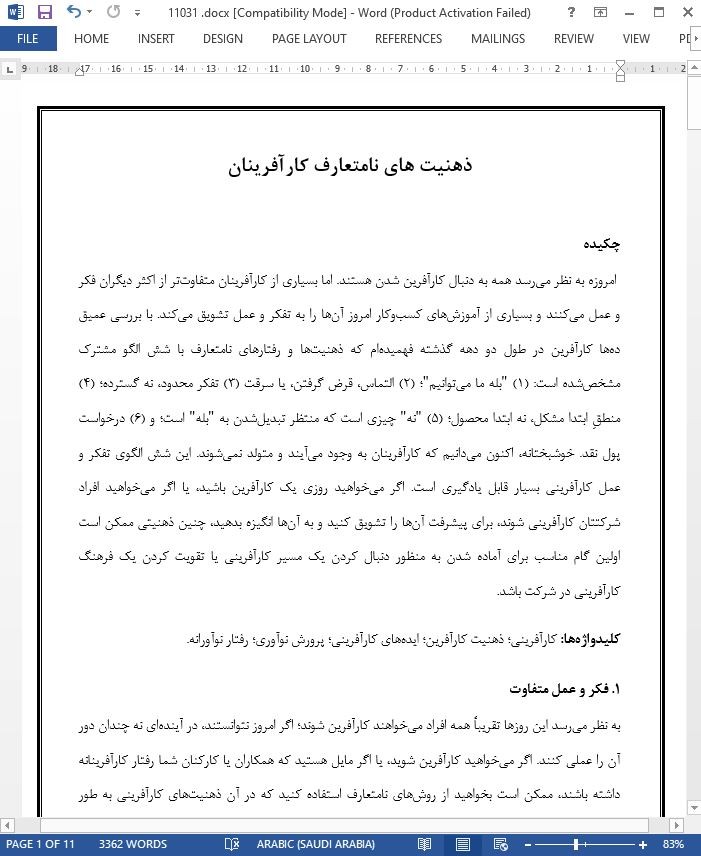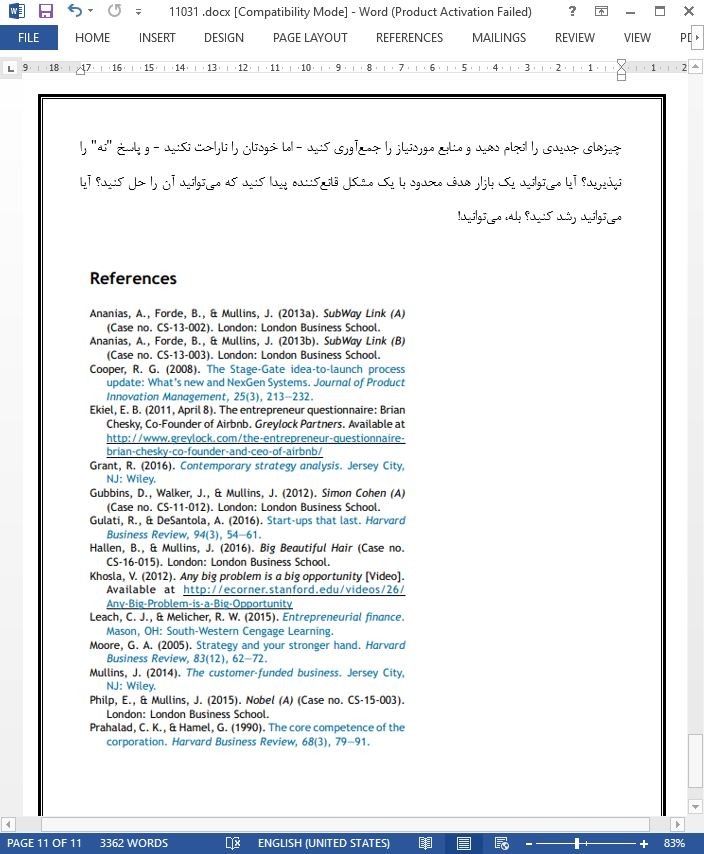
ذهنیت های نامتعارف کارآفرینان
چکیده
امروزه به نظر میرسد همه به دنبال کارآفرین شدن هستند. اما بسیاری از کارآفرینان متفاوتتر از اکثر دیگران فکر و عمل میکنند و بسیاری از آموزشهای کسبوکار امروز آنها را به تفکر و عمل تشویق میکند. با بررسی عمیق دهها کارآفرین در طول دو دهه گذشته فهمیدهام که ذهنیتها و رفتارهای نامتعارف با شش الگو مشترک مشخصشده است: (1) "بله ما میتوانیم"؛ (2) التماس، قرض گرفتن، یا سرقت (3) تفکر محدود، نه گسترده؛ (4) منطقِ ابتدا مشکل، نه ابتدا محصول؛ (5) "نه" چیزی است که منتظر تبدیلشدن به "بله" است؛ و (6) درخواست پول نقد. خوشبختانه، اکنون میدانیم که کارآفرینان به وجود میآیند و متولد نمیشوند. این شش الگوی تفکر و عمل کارآفرینی بسیار قابل یادگیری است. اگر میخواهید روزی یک کارآفرین باشید، یا اگر میخواهید افراد شرکتتان کارآفرینی شوند، برای پیشرفت آنها را تشویق کنید و به آنها انگیزه بدهید، چنین ذهنیتی ممکن است اولین گام مناسب برای آماده شدن به منظور دنبال کردن یک مسیر کارآفرینی یا تقویت کردن یک فرهنگ کارآفرینی در شرکت باشد.
1. فکر و عمل متفاوت
به نظر میرسد این روزها تقریباً همه افراد میخواهند کارآفرین شوند؛ اگر امروز نتوانستند، در آیندهای نه چندان دور آن را عملی کنند. اگر میخواهید کارآفرین شوید، یا اگر مایل هستید که همکاران یا کارکنان شما رفتار کارآفرینانه داشته باشند، ممکن است بخواهید از روشهای نامتعارف استفاده کنید که در آن ذهنیتهای کارآفرینی به طور معمول به کار گرفته میشوند. در اغلب موارد، مشخص میشود که شش روش تفکر و عمل وجود دارد که در قلب تلاشهای کارآفرینی جای گرفتهاند.
2. شما چهکار میکنید؟
خبر خوب این است که کارآفرینان بزرگ تقریباً همیشه به وجود میآیند و متولد نمیشوند. درست مثل آرنولد کوریا که آموخت آنچه شرکتش قبل از آن انجام نداده بود را بارها و بارها انجام بدهد و توماس نوبل از همکلاسیاش قدرت استقامت را آموخت، بنابراین شما نیز میتوانید یاد بگیرند که مانند یک کارآفرین فکر و عمل کنید. آیا میتوانید چیزهای جدیدی را انجام دهید و منابع موردنیاز را جمعآوری کنید - اما خودتان را ناراحت نکنید - و پاسخ "نه" را نپذیرید؟ آیا میتوانید یک بازار هدف محدود با یک مشکل قانعکننده پیدا کنید که میتوانید آن را حل کنید؟ آیا میتوانید رشد کنید؟ بله، میتوانید!
Abstract
These days, it seems, nearly everyone aspires to be an entrepreneur. But many entrepreneurs think and act differently than the way in which most other businesspeople do and the way much of today’s business education encourages them to think and act. My in-depth examination of dozens of entrepreneurs I’ve come to know well over the past 2 decades tells me that their unconventional–—or, dare I say, counter-conventional–—mindsets and behaviors are marked by six common patterns: (1) ‘Yes, we can;’ (2) beg, borrow, or steal; (3) think narrow, not broad; (4) problemfirst, not product-first logic; (5) ‘No’ is something waiting to be turned into ‘Yes’; and (6) ask for the cash and ride the float. Thankfully, we now know that entrepreneurs are made, not born. These six patterns of entrepreneurial thought and action are eminently learnable. If you want to someday be an entrepreneur, or if you want the people in your company to become more entrepreneurial, then developing–—or encouraging and incentivizing your people to develop–—such a mindset might constitute a suitable first step toward preparing you to follow a more entrepreneurial path or to foster a more entrepreneurial culture in your company.
1. Think differently, act differently
These days, it seems, almost everyone fancies being an entrepreneur; if not today, sometime in the nottoo-distant future. If you aspire to join their ranks, or if you wish your coworkers or employees could become more entrepreneurial, you might want to give some thought to the surprising and not simply unconventional–—but somewhat counterconventional–—ways in which entrepreneurial minds typically work. More often than not, I find, they exhibit six ways of thinking and acting that lie at the very heart of their entrepreneurial endeavors.
2. So, what about you?
The good news is that great entrepreneurs are almost always made, not born. Just as Arnold Correia learned to repeatedly do what his company had not done before and Thomas Knobel learned from a college classmate the power of persistence, so, too, can you learn to think and act like an entrepreneur. Can you do new things and assemble–—but not bother to own–—the resources you’ll need, and not take ‘No’ for an answer? Can you find a narrow target market having a compelling problem you can solve? Can you ride the float and grow? Yes, you can!
چکیده
1. فکر و عمل متفاوت
1-1 "بله ما میتوانیم"
1-2 التماس، قرض گرفتن یا سرقت
1-3 تفکر محدود، نه گسترده
1-4 منطقِ ابتدا مشکل، نه ابتدا محصول
1-5. "نه" چیزی است که منتظر است به "بله" تبدیل شود
1-6 درخواست پول نقد
2. شما چهکار میکنید؟
Abstract
1. Think differently, act differently
1.1. ‘Yes, we can’
1.2. Beg, borrow, or steal
1.3. Think narrow, not broad
1.4. Problem-first, not product-first logic
1.5. ‘No’ is something waiting to be turned into ‘Yes’
1.6. Ask for the cash and ride the float
2. So, what about you?
- اصل مقاله انگلیسی با فرمت ورد (word) با قابلیت ویرایش
- ترجمه فارسی مقاله با فرمت ورد (word) با قابلیت ویرایش، بدون آرم سایت ای ترجمه
- ترجمه فارسی مقاله با فرمت pdf، بدون آرم سایت ای ترجمه


